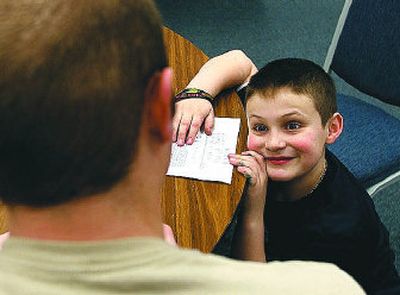Students learn to help

Sarah Urlacher was somewhat interested in community service during her years as a high school student in Billings.
But that has flowered into a full-blown commitment during her years at Gonzaga University, where she has worked as a Special Olympics coach, a student mentor and in a homeless shelter. When she graduates in May, she plans to enter the Peace Corps.
“Coming here, I realized how many opportunities there are to get involved,” said Urlacher, a 22-year-old senior majoring in special education. “It’s been great. I feel very fortunate to have been at Gonzaga and exposed to all this service learning.”
Urlacher’s path into the Peace Corps is a common one at GU. For two years running, it has ranked fourth among schools its size for the number of graduates entering the Peace Corps, according to the organization’s annual ranking.
The ranking was the latest recognition for the school’s efforts to instill the “habit of service” in its students, and it reflects a growing emphasis at GU on merging academic programs and service opportunities. While there’s plenty of volunteering going on outside the classroom, nearly 60 courses in the last academic year included some kind of community service requirement, said Sima Thorpe, director of GU’s Center for Community Action and Service Learning.
“It’s different than an internship because there’s that civic engagement and social justice piece there,” she said. “Students have the opportunity to make sense out of and reflect on the effect of their service on their own personal development. So it develops their values.”
Twenty-seven GU graduates entered the Peace Corps this year, placing the school fourth among the colleges with undergraduate enrollments of 5,000 or less. Tacoma’s University of Puget Sound was first in that category, while the University of Washington was first among large schools.
The Peace Corps is a 27-month commitment to volunteer either at home or abroad.
All told, GU students volunteered more than 100,000 hours in each of the last two years, Thorpe said. Those efforts include after-school mentoring programs, volunteering at nonprofits and developing educational programs for impoverished communities in Africa.
In addition to sending a lot of graduates into the Peace Corps, Thorpe said, GU sends more grads than any other school in the country to the Jesuit Service Program, a one-year commitment to do community service in various locations worldwide.
“I am also talking to a lot of students … about going into AmeriCorps,” the national volunteer program, she said.
Gonzaga’s efforts to promote service learning were also noted in “Student Success in College,” a 2005 book that highlights effective educational programs nationwide.
The shift toward “academic service learning” – or service projects that are incorporated into the regular curriculum of specific courses – has been pronounced in recent years. Thorpe said that when she came to GU 13 years ago, only three courses had formal requirements for community service.
That grew to 58 last academic year, and she hopes it continues to grow.